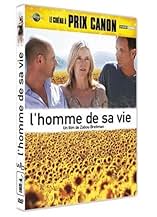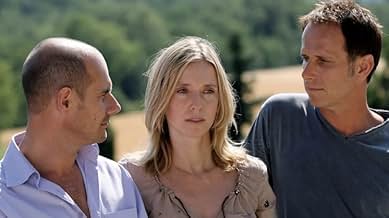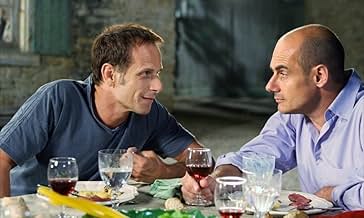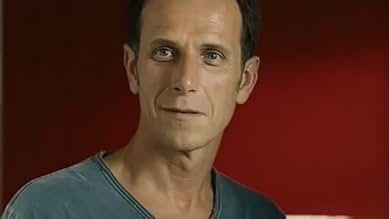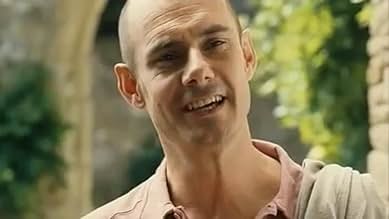IMDb RATING
6.6/10
1.2K
YOUR RATING
On summer holiday in Provence, Frédéric meets Hugo and develops a powerful bond that threatens his family.On summer holiday in Provence, Frédéric meets Hugo and develops a powerful bond that threatens his family.On summer holiday in Provence, Frédéric meets Hugo and develops a powerful bond that threatens his family.
- Awards
- 1 win total
Featured reviews
I keep forgetting name of this movie and I describe it as the French movie with the two guys talking all night and the sheer drapes flowing in the wind. I found it to be one of the best gay movies ever. It's honest and deeper than most. It's also very French. Which is fine by me. But it won't be for everyone. A couple of years after watching it I choose it again thinking it was something I hadn't seen. A few minutes in I realized I had and watched it all over again.
Set in the stunningly beautiful Provencal region of France, "The Man of My life" looks at how both passion and responsibility play an equally crucial role in defining who we are and how we love.
Frederic (Bernard Campan) and Frederique (Lea Drucker) are a happily married couple who enjoy entertaining large groups of people at the country home where they vacation. One day, Frederic invites their next door neighbor, a single gay man by the name of Hugo (Charles Berling), over for a get-together with family and friends. Soon, Frederic and Hugo have struck up a friendship largely centered on their mutual addiction to running and their propensity to talk the night away over such weighty matters as love, passion, responsibility, freedom, commitment and marriage. Hugo tries to convince Frederic that his role as dutiful husband and father has robbed him of his individuality and earlier lust for life, while Hugo, spurned by his father at a young age, comes to his own understanding of the importance of family by the end. There's an obvious sexual attraction between the two men, but the movie goes far beyond the typical coming-out drama to explore romantic passion in all its myriad complexities and forms.
Frederic is torn between the desire to continue loving the wife who so obviously loves him and who has provided a stable home for him and their children - and this new found feeling for Hugo that he can, in no way, shape or form, even begin to understand. The movie never feels the need to judge any of the characters; it presents them simply as well-meaning but flawed human beings who struggle on a daily basis, as all of us do, with an array of emotions, needs and desires that continually come into conflict with one another.
The screenplay by Zabou Breitman and Agnes de Sacy employs long, winding conversations to reveal the truths about the characters and the relationships that help to define them. Moreover, the sensuous, bucolic setting, far from being a mere backdrop to the foreground action, actually serves to pull us into the lives of these people as they while away a languid summer swimming, hiking and exploring the inner workings of their own roiled psyches.
In his direction, Breitman has come up with interesting, slightly abstract ways of filming the commonplace details of everyday life, utilizing extreme close-ups, distorted angles, catawampus framing and mosaic-style storytelling to impart a lyrical tone to the film.
Superb performances by the three leading players also add greatly to the emotional richness of the piece.
With a great deal of insight and tenderness, "The Man of My Life" presents us with a subtly provocative, beautifully realized and psychologically complex view of the human heart.
Frederic (Bernard Campan) and Frederique (Lea Drucker) are a happily married couple who enjoy entertaining large groups of people at the country home where they vacation. One day, Frederic invites their next door neighbor, a single gay man by the name of Hugo (Charles Berling), over for a get-together with family and friends. Soon, Frederic and Hugo have struck up a friendship largely centered on their mutual addiction to running and their propensity to talk the night away over such weighty matters as love, passion, responsibility, freedom, commitment and marriage. Hugo tries to convince Frederic that his role as dutiful husband and father has robbed him of his individuality and earlier lust for life, while Hugo, spurned by his father at a young age, comes to his own understanding of the importance of family by the end. There's an obvious sexual attraction between the two men, but the movie goes far beyond the typical coming-out drama to explore romantic passion in all its myriad complexities and forms.
Frederic is torn between the desire to continue loving the wife who so obviously loves him and who has provided a stable home for him and their children - and this new found feeling for Hugo that he can, in no way, shape or form, even begin to understand. The movie never feels the need to judge any of the characters; it presents them simply as well-meaning but flawed human beings who struggle on a daily basis, as all of us do, with an array of emotions, needs and desires that continually come into conflict with one another.
The screenplay by Zabou Breitman and Agnes de Sacy employs long, winding conversations to reveal the truths about the characters and the relationships that help to define them. Moreover, the sensuous, bucolic setting, far from being a mere backdrop to the foreground action, actually serves to pull us into the lives of these people as they while away a languid summer swimming, hiking and exploring the inner workings of their own roiled psyches.
In his direction, Breitman has come up with interesting, slightly abstract ways of filming the commonplace details of everyday life, utilizing extreme close-ups, distorted angles, catawampus framing and mosaic-style storytelling to impart a lyrical tone to the film.
Superb performances by the three leading players also add greatly to the emotional richness of the piece.
With a great deal of insight and tenderness, "The Man of My Life" presents us with a subtly provocative, beautifully realized and psychologically complex view of the human heart.
This was just so bad. It should be shown in film course as an example of what not to do. Watching it reminded me of a line from the 1932 movie "Grand Hotel," where Greta Garbo says " People come, people go; nothing ever happens." Ostensibly about the evolving relationship between gay Hugo and straight Frederick, the movie is littered with numerous characters and plot threads that do nothing but confuse. While beautiful to look at, the cinematographer is as confusing as whatever passes for a plot. Repetition does nothing to give meaning to shot after shot. A sad waste of the efforts of a decent cast trying to give meaning to utter BS.
Summer somewhere in France. A couple and their young son invite family and friends to enjoy a warm rural holiday at their old but comfortable summer house. A neighbor, a middle-aged single man, is invited to join the first night's outdoor party. It is quickly revealed that the man is gay. He and the husband start a tentative friendship. How far will it go?
Beyond the apparently simple plot line, what struck me about this film were the visual aspects. A playful camera delights us with unconventional angles, framing, superpositions and transitions. Combining beautiful cinematography and great editing, the end result is a superb film. The tango music is icing on the cake.
Beyond the apparently simple plot line, what struck me about this film were the visual aspects. A playful camera delights us with unconventional angles, framing, superpositions and transitions. Combining beautiful cinematography and great editing, the end result is a superb film. The tango music is icing on the cake.
Filmmakers invest a great deal of creativity and inspiration into their work, so I hesitate to write a negative review, but I'm compelled to make an exception here.
What a pretentious, self-indulgent waste of time. It steadily succumbs to self-conscious artiness, drunk on its own sense of contrived poetry.
It's sumptuously filmed, but ultimately shallow, empty, and a little boring. There's a good story waiting to be told that gets lost in useless side plots, languorous panoramas, and tedious conversations.
There's a germ of a very good idea in the screenplay, but I just don't feel that the writers fully grasped what they were undertaking.
Don't waste your time.
What a pretentious, self-indulgent waste of time. It steadily succumbs to self-conscious artiness, drunk on its own sense of contrived poetry.
It's sumptuously filmed, but ultimately shallow, empty, and a little boring. There's a good story waiting to be told that gets lost in useless side plots, languorous panoramas, and tedious conversations.
There's a germ of a very good idea in the screenplay, but I just don't feel that the writers fully grasped what they were undertaking.
Don't waste your time.
Did you know
Details
Box office
- Gross US & Canada
- $7,704
- Opening weekend US & Canada
- $2,991
- Sep 23, 2007
- Gross worldwide
- $2,542,577
- Runtime
- 1h 54m(114 min)
- Color
- Sound mix
- Aspect ratio
- 1.85 : 1
Contribute to this page
Suggest an edit or add missing content

![Watch Bande-annonce [OV]](https://m.media-amazon.com/images/M/MV5BZDFjNDkxNTUtMWU2Mi00YjNiLTg1MDYtNGQ5N2ZlNzM0NTk1XkEyXkFqcGdeQXRyYW5zY29kZS13b3JrZmxvdw@@._V1_QL75_UX500_CR0)
